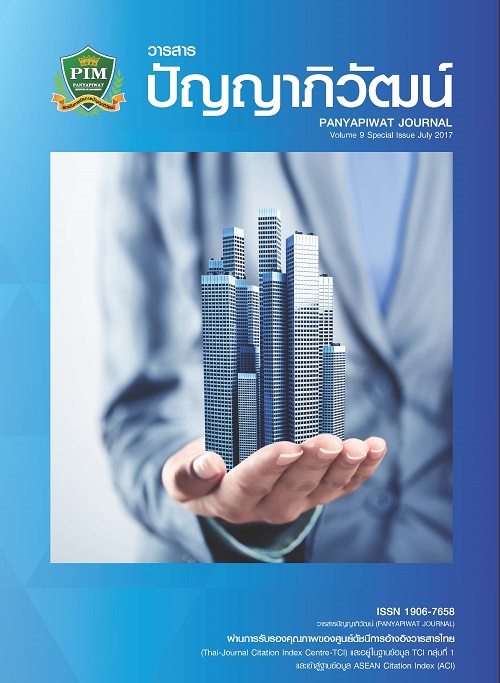การพัฒนาบทเรียน e-Learning เรื่องโปรแกรมนำเสนอผลงานของนักศึกษาเจเนอเรชั่น วาย สถาบันอุดมศึกษาเอกชน
Main Article Content
บทคัดย่อ
การวิจัยครั้งนี้มีวัตถุประสงค์เพื่อ 1. เพื่อพัฒนาบทเรียน e-Learning เรื่องโปรแกรมการนำเสนอผลงาน ของนักศึกษาเจเนอเรชั่น วาย 2. เพื่อเปรียบเทียบผลสัมฤทธิ์ทางการเรียนก่อนและหลังเรียนด้วย e-Learning ของนักศึกษาเจเนอเรชั่น วาย กลุ่มตัวอย่างคือ นักศึกษาชั้นปีที่ 1 ปีการศึกษา 2559 สถาบันอุดมศึกษาเอกชน สถิติที่ใช้วิเคราะห์ข้อมูล ได้แก่ ค่ามัธยฐานและพิสัยระหว่างอินเทอร์ควอไทล์ (Interquartile) เพื่อการวิเคราะห์แบบสอบถามเทคนิคเดลฟาย (Delphi Technique) ค่าเฉลี่ย Paired samples t-test
ผลการวิจัยพบว่า ประสิทธิภาพของบทเรียน e-Learning ที่สร้างขึ้น มีค่า 81.5/82.3 บทเรียนมีคุณภาพอยู่ในเกณฑ์ดี (X= 4.35) ผลสัมฤทธิ์ทางการเรียนของนักเรียนหลังเรียนแตกต่างจากก่อนเรียน อย่างมีนัยสำคัญทางสถิติที่ระดับ .05 โดยผลสัมฤทธิ์ทางการเรียนจากคะแนนเต็ม 40 คะแนน พบว่าคะแนนหลังเรียนมากกว่าก่อนเรียนอยู่ที่ 6.267 คะแนน และความคิดเห็นของนักศึกษาที่มีต่อบทเรียนผ่าน e-Learning อยู่ในระดับดี (X= 4.24)
This research aimed to 1. Develop the e-Learning program on presentations of student generations Y 2. To compare learning achievement before and after learning with e-Learning of student generations Y. The sample group is 1st year student (Academic year 2016) Private higher education Institution. The data were analysed by using median and interquartile range. Analyzing questionnaire was succeeded by using Delphi technique. Paired samples t-test.
The research found that, the efficiency of the e-Learning lessons was 81.5/82.3. The quality of the lessons was good (X= 4.35). The achievement score revealed that, in total of 40 marks, the students got approximately 6.267 points more marks from their post–test. The students opinion of the students toward studying a good (X= 4.24)
Article Details
“ข้าพเจ้าและผู้เขียนร่วม (ถ้ามี) ขอรับรองว่า บทความที่เสนอมานี้ยังไม่เคยได้รับการตีพิมพ์และไม่ได้อยู่ระหว่างกระบวนการพิจารณาลงตีพิมพ์ในวารสารหรือแหล่งเผยแพร่อื่นใด ข้าพเจ้าและผู้เขียนร่วมยอมรับหลักเกณฑ์การพิจารณาต้นฉบับ ทั้งยินยอมให้กองบรรณาธิการมีสิทธิ์พิจารณาและตรวจแก้ต้นฉบับได้ตามที่เห็นสมควร พร้อมนี้ขอมอบลิขสิทธิ์บทความที่ได้รับการตีพิมพ์ให้แก่สถาบันการจัดการปัญญาภิวัฒน์หากมีการฟ้องร้องเรื่องการละเมิดลิขสิทธิ์เกี่ยวกับภาพ กราฟ ข้อความส่วนใดส่วนหนึ่งและ/หรือข้อคิดเห็นที่ปรากฏในบทความข้าพเจ้าและผู้เขียนร่วมยินยอมรับผิดชอบแต่เพียงฝ่ายเดียว”
เอกสารอ้างอิง
Aroonpiboon, B. (2004). E-learning in Thailand. Pathum Thani: TNRR. [in Thai]
Dechawattanapaisarn, D. (2009). Perceived attributes of Generation Y and Work Motivation: Vision into other Generations in an Enterprise. Chulalongkorn Business Review, 31(121), 2-8. [in Thai]
Glass, A. (2007). Understanding generational differences for competitive success. Industrial and Commercial Training, 39(2), 98-103.
Lowhacharajsang, T. (1998). Computer Assisted Teaching. Bangkok: Department of Audio-Visual Education, Faculty of Education, Chulalongkorn University. [in Thai]
Pitsathorn, P. et al. (2002). Here e-learning. Bangkok: Se-Education. [in Thai]
Promvong, C., Songsawang, B. & Thaveekulsup, V. (2008). The content of the curriculum development curriculum and media (2nd ed.). Bangkok: Sukhothai Thammathirat University. [in Thai]
Rattanapian, V. (1999). Web-based instruction: A new alternative for Thai educational technology. Journal of Education Studies, 27(3), 29-35. [in Thai]
Ruangrit, N. (2003). The Development of web-based instruction course in technology in photography: cameras and accessories for undergraduate students, Department of Educational Technology, Faculty of Education, Burapha University. Master of Education, Department of Educational Technology Graduate School, Silpakorn University. [in Thai]
Sai-seesod. (2002). The Development of Internet-Based Learning System for Rajabhat Institutes. Master of Education, Srinakarinwirot University. [in Thai]
Saiyos, L. & Saiyos, A. (1995). Educational Research Techniques (5th ed.). Bangkok: Suviriyasarn. [in Thai]
Songkram, N. (2000). Effects of Cognitive Styles and Structures of Web-Based Instruction Program upon Learning Achievement in Foundation of Computer for Education Course for Undergraduate Students, Faculty of Education, Chulalongkorn University. Master, Education (Audio-Visual Communications), Chulalongkorn University. [in Thai]
Sukha, S (2002). The development of a web model for Self-directed learning. Doctor of Education, Srinakarinwirot University. [in Thai]


